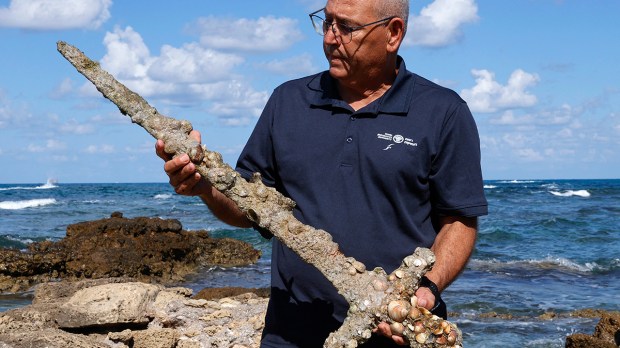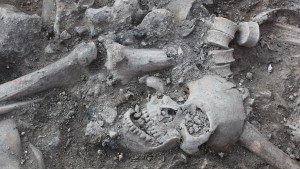An amateur diver off the coast of Israel has made a once-in-a-lifetime discovery on Carmel Beach, just outside Haifa. While enjoying some afternoon scuba diving, Shlomi Katzin spotted a sediment-encrusted object that resembled a sword. Upon recovering the object, it was revealed that it was indeed a sword and one from the time of the Crusades.
According to The Hill,the sword, while completely covered in shell and rocks, was preserved in pristine condition. Israel Antiquities Authority’s (IAA)Robbery Prevention Unit Inspector Nir Distelfeld described the artifact:
“The sword, which has been preserved in perfect condition, is a beautiful and rare find and evidently belonged to a Crusader knight,” said IAA’s Robbery Prevention Unit Inspector Nir Distelfeld. “It was found encrusted with marine organisms but is apparently made of iron. It is exciting to encounter such a personal object, taking you 900 years back in time to a different era, with knights, armor and swords.”
The Crusades
The sword was determined to be about 900 years old. The Jerusalem Post notes that the Carmel coast was a hotbed of Crusader activity in the 12th century. They posit that the sword may have been from an English campaign to retake Jerusalem after the Muslim Sultan Saladin won the city in battle with the Crusader’s Christian city-states. The Crusaders succeeded in 1191 at the battle of Arsuf.
It is not clear how the sword wound up at the bottom of the sea, not far from shore. It could have been a shipwreck or perhaps a beachfront battle; however there were few similar artifacts of battle discovered near it. Israeli Antiquities Authority has stated that they intend to launch an investigation of the seabed where it was discovered.
IAA’s Marine Archaeology Unit Director Kobi Sharvit noted that archeological evidence found on the seafloor is a time-sensitive find. The seabed is always changing with the tides and weather events. Due to this ever-shifting nature it makes excavation much harder than on dry land. Sharvit said:
“Underwater surveying is dynamic,” said Sharvit. “Even the smallest storm moves the sand and reveals areas on the seabed, meanwhile burying others. It is therefore vitally important to report any such finds and we always try to document them in situ, in order to retrieve as much archaeological data as possible.”


